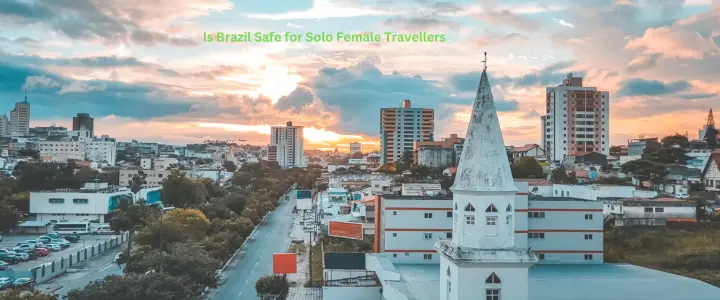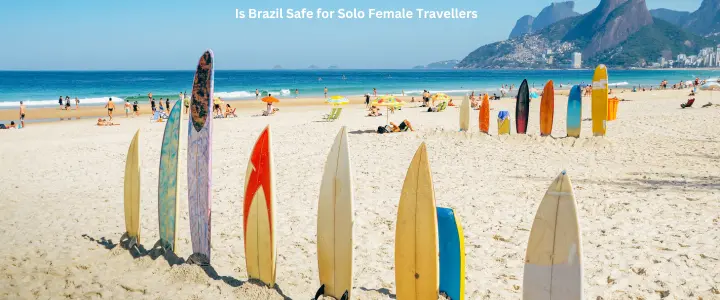Travelling Alone To Brazil
When I first started traveling solo, I never imagined the incredible places I would visit, from the vibrant streets of Berlin to the cozy cafés of Belgium. Each destination had its own charm and unique experience. But when I planned my solo trip to Brazil, I couldn’t help but wonder, Is Brazil safe for solo female travellers? It’s a question that crossed my mind more than once, especially after hearing so many mixed stories about the country. With Brazil being so big and diverse, I wanted to know what it would really be like as a solo female traveller exploring the colorful streets, iconic landmarks like Christ the Redeemer, and the energy of Rio’s famous Carnival.

My journey through Brazil was unforgettable, filled with breathtaking sights and vibrant cultures. From dancing at Samba clubs to taking in the stunning views from Sugarloaf Mountain, Brazil had so much to offer. But, just like any country, there were a few things I needed to be cautious about as a solo traveler. Through my experience, I learned that while Brazil has its risks, with a little preparation and awareness, it can also be a wonderful destination. In this guide, I’ll share the insights and tips I gathered on how to stay safe and truly enjoy everything Brazil has to offer for solo female travelers.
Table of Contents
Understanding the Safety Situation in Brazil for Solo Female Travellers
Crime Rates and Risks in Brazil
When planning a trip to Brazil, especially as a solo female traveler, understanding the country’s crime rates is essential. Brazil has a reputation for being a high-risk destination, primarily due to its high rates of theft, pickpocketing, and violent crimes in certain regions. However, the risk levels vary significantly depending on where you go.
In major tourist cities like Rio de Janeiro, São Paulo, and Salvador, tourists are often the target of petty crimes like pickpocketing. It’s essential to stay alert, especially in crowded areas such as beaches, markets, and public transportation hubs. According to a report by the Overseas Security Advisory Council (OSAC), petty theft is one of the most common crimes tourists encounter in Brazil.
That said, Brazil is a large country, and crime rates are higher in some cities than in others. For example, Rio de Janeiro has well-documented safety issues, but by sticking to safer neighborhoods and tourist zones, travelers can significantly reduce the risk of crime. On the other hand, cities like Florianópolis or Brasília tend to have lower crime rates and are considered safer for tourists, including solo female travelers.
Top Safety Concerns:
- Pickpocketing: Common in crowded areas and public transport.
- Mugging: This can happen in isolated or poorly lit areas.
- Scams: Tourist scams, such as overcharging or distraction thefts, are common.
Tips to Stay Safe:
- Avoid carrying large amounts of cash or flashy jewelry.
- Use cross-body bags that are difficult to snatch.
- Stay in well-lit, populated areas, especially at night.
Is Brazil Safe for Tourists?
Despite the country’s safety concerns, millions of tourists, including solo female travelers, visit Brazil every year and enjoy a safe experience. According to Brazil’s Ministry of Tourism, the country welcomed over 6 million international visitors in 2019, with many enjoying iconic landmarks like Christ the Redeemer and Sugarloaf Mountain without major incidents.
The key to staying safe lies in proper planning, awareness, and vigilance. For example, avoiding high-risk areas, using reputable transportation services, and blending in with locals can significantly enhance your safety as a solo female traveler. Tourist areas, while still requiring caution, are generally patrolled by police, especially during major events like Carnival.

Safe Destinations in Brazil for Solo Female Travellers
Rio de Janeiro
Rio de Janeiro is one of the most iconic cities in Brazil, known for landmarks such as Christ the Redeemer, Sugarloaf Mountain, and its world-famous Carnival. While Rio is a must-see destination, it’s also one of the cities where safety concerns are highest. That said, there are neighborhoods and attractions where solo female travelers can feel secure with the right precautions.
Safe Areas to Visit in Rio:
- Copacabana and Ipanema: These beach neighborhoods are well-patrolled and tourist-friendly.
- Santa Teresa: Known for its charming atmosphere, Santa Teresa is great for cultural experiences but should be explored during the day.
- Lapa: Famous for its samba clubs, Lapa is lively but can be dangerous at night. Stick to well-known venues and travel with others or by trusted transportation.
Things to Watch Out for in Rio:
- Beach Theft: While relaxing on the beach, keep an eye on your belongings, as theft is common.
- Night Safety: After dark, it’s best to stay in populated areas and avoid walking alone.
Pro Tip: If you’re attending Carnival in Rio, avoid carrying valuables and use a money belt under your clothes. Stick to the main parade areas, as petty theft is more common in large crowds.
Salvador
Salvador, the capital of the Bahia state, is famous for its Afro-Brazilian culture, historic center, and vibrant festivals. It’s one of Brazil’s safest large cities for tourists, though solo female travelers should still exercise caution.
Safe Areas to Explore:
- Pelourinho: A UNESCO World Heritage site, Pelourinho is the historical center of Salvador and is generally safe during the day. However, it’s advisable to avoid this area after dark.
- Barra: This beach district is known for its safe, tourist-friendly environment and offers beautiful beaches and nightlife.
Unique Safety Tips for Salvador:
- Be cautious in crowded areas, especially during festivals.
- Avoid deserted streets and poorly lit areas after sundown.
Florianópolis
Known for its beaches and laid-back lifestyle, Florianópolis is considered one of the safest cities in Brazil, making it ideal for solo female travelers. It’s a popular destination for those seeking a mix of natural beauty and cultural experiences without the high crime risks associated with larger cities.
Why Florianópolis is a Safer Choice:
- Lower crime rates compared to cities like Rio or São Paulo.
- Popular with both international tourists and locals, ensuring good infrastructure and safety measures.
Other Safe Destinations:
- Brasília: As the capital, Brasília is known for its unique architecture and relatively low crime rate.
- Paraty: A colonial town located between Rio and São Paulo, Paraty offers history, nature, and a relaxed atmosphere with less crime.

Transportation Safety for Solo Female Travellers in Brazil
One key concern for any solo traveler is safe and reliable transportation. In Brazil, options range from taxis and ride-hailing apps to buses and metros. However, not all transportation methods are equally safe.
Ride-Hailing Apps: The Best Option
Ride-hailing services like Uber and 99 are widely available in Brazilian cities and are generally considered safer than public taxis. The benefit of using these apps is that they track your route and have reviews from previous riders. For solo female travelers, this provides an extra layer of security.
Tips for Using Ride-Hailing Apps Safely:
- Always check the license plate and driver details before getting in.
- Share your trip details with a friend or family member.
- Avoid sitting in the front seat.
Public Transportation: Proceed with Caution
Brazil’s public transport system is affordable, but it’s not always the safest option for solo female travelers, particularly in cities like Rio and São Paulo. Buses and metros can be crowded, creating opportunities for pickpockets.
Tips for Safe Public Transport Use:
- Metro: Generally safe during the day, especially in cities like Rio and São Paulo. Avoid during peak hours to steer clear of crowded conditions.
- Buses: Exercise caution, as buses can be prone to theft. Opt for daytime travel and use official terminals when possible.
Cultural Tips to Stay Safe in Brazil
Brazil has a rich and diverse culture, and understanding some of the social norms can help you stay safer and blend in better as a solo female traveller. Here are some cultural tips that can enhance your experience while keeping you out of risky situations.
Clothing Choices
Brazil’s warm climate means that lightweight, casual clothing is common, especially in beach towns. However, in some areas, revealing clothing might attract unwanted attention. It’s a good idea to dress modestly in certain situations, especially when visiting more conservative cities or religious sites.
Dress Modestly When:
- Visiting churches or religious landmarks.
- Walking in smaller towns or rural areas.
- Exploring non-tourist urban areas.
Learning Basic Portuguese
While many Brazilians in tourist areas speak English, it’s helpful to learn basic Portuguese phrases. Knowing how to ask for help or directions in the local language can be invaluable in navigating unfamiliar places and getting assistance when needed.
Common Portuguese Phrases for Travellers:
- “Por favor” (Please)
- “Obrigado/a” (Thank you)
- “Quanto custa?” (How much does it cost?)
- “Onde fica…?” (Where is…?)
How to Handle Emergencies
Despite all precautions, emergencies can happen. Having a plan for how to deal with these situations can make a big difference in your safety and peace of mind.
Emergency Numbers in Brazil
- Police: 190
- Ambulance: 192
- Fire Department: 193
Make sure to keep these numbers handy and know where the nearest embassy or consulate is located.
What to Do in Case of:
- Theft: If your belongings are stolen, report the incident to the local police immediately. File a report, as you’ll need this for insurance claims or if your passport was stolen.
- Health Emergencies: Brazil has both private and public healthcare systems. Public hospitals may be overcrowded, so if possible, opt for private care or have travel insurance that covers private hospitals.
- Lost Passport: Contact your nearest embassy or consulate for assistance in getting a replacement passport. Make sure to carry copies of important documents like your passport and insurance information.
Final Thoughts: Is Brazil Safe for Solo Female Travellers?
Brazil can be a rewarding destination for solo female travelers with its stunning natural landscapes, vibrant culture, and unforgettable experiences like Carnival and the Samba clubs. However, the country does have its risks, and safety should always be a priority.
By sticking to well-trodden paths, using safe transportation methods, and remaining vigilant, you can enjoy Brazil while minimizing the risks. Ultimately, the key is to stay aware of your surroundings, avoid dangerous areas, and follow the travel safety tips outlined in this guide.
Brazil offers so much for those willing to explore it, from the beaches of Rio to the cultural hubs of Salvador and Florianópolis. With the right preparation, solo female travelers can safely experience all the beauty and excitement this country has to offer.
FAQs
1. Is Rio de Janeiro safe for solo female travellers?
Rio de Janeiro can be safe for solo female travelers, but it comes with certain risks. Popular tourist areas like Copacabana, Ipanema, and Sugarloaf Mountain are generally well-policed, but it’s important to remain vigilant. Avoid walking alone at night, stay in reputable accommodations, use ride-hailing apps like Uber for transportation, and avoid flashing valuables. During crowded events like Carnival, extra caution is needed to prevent theft or pickpocketing.
2. Is Brazil safe for American tourists?
Yes, Brazil can be safe for American tourists as long as common-sense precautions are followed. Stay in tourist-friendly areas, avoid unsafe neighborhoods, and remain aware of your surroundings. Violent crime and petty theft do occur, especially in large cities, so it’s best to avoid risky areas and not flaunt wealth. Learning basic Portuguese and keeping emergency numbers handy can also improve safety.
3. What is the safest country for solo female travellers?
Countries like Iceland, New Zealand, Finland, and Japan are often ranked as some of the safest for solo female travelers due to low crime rates, excellent public safety, and welcoming local cultures. While Brazil has beautiful destinations, it’s important for solo female travellers to exercise greater caution compared to these countries.
4. Is it safe to walk alone in Brazil?
Walking alone in Brazil can be risky, especially at night or in less populated areas. In major cities like Rio de Janeiro or São Paulo, it’s better to avoid walking alone in certain neighborhoods and after dark. In well-known tourist areas, walking during the day can be safe, but it’s always a good idea to remain cautious, stick to crowded places, and use Uber or other safe transportation options when necessary.
5. Is Brazil safe for a girls’ trip?
Brazil can be a great destination for a girls’ trip if you stay in safe, tourist-friendly areas and follow safety precautions. Destinations like Florianópolis, Salvador, and tourist spots in Rio de Janeiro can offer memorable experiences. Traveling in a group often provides extra security, but it’s still important to avoid risky neighborhoods, be cautious of petty theft, and plan transportation ahead of time.
6. What should I be careful of in Brazil?
In Brazil, travelers should be cautious of:
- Petty theft: Especially in crowded areas and on public transportation.
- Unsafe neighborhoods: Research safe areas and avoid risky parts of big cities.
- Nighttime outings: Avoid walking alone at night and use safe transportation.
- Beach thefts: Don’t leave belongings unattended on the beach.
- Scams: Be cautious when interacting with strangers offering unsolicited help or services.
- Wildlife: In more remote areas, be mindful of insects, snakes, and other wildlife.
7. Is Brazil friendly to the US?
Yes, Brazil generally has a friendly relationship with the US, and American tourists are welcomed in most parts of the country. While some locals may not speak English fluently, they are often warm and helpful to foreign visitors. It’s useful to learn basic Portuguese phrases to enhance communication.
8. Is Brazil or Portugal safer?
Portugal is considered significantly safer than Brazil for solo travelers, especially women. Portugal has a lower crime rate, better public safety infrastructure, and fewer areas where tourists need to exercise high levels of caution. While Brazil has more safety challenges, both countries offer rich cultural experiences, with proper precautions needed when visiting Brazil.
9. Is Brazil cheap or expensive?
The cost of traveling in Brazil varies depending on the region and lifestyle. Major cities like Rio de Janeiro and São Paulo can be expensive, particularly for accommodations, dining, and transportation. However, Brazil can be quite affordable in smaller towns or rural areas. Budget-conscious travelers can find good deals on hostels, street food, and public transportation, making it a relatively accessible destination for various budgets.
10. What should I do if I feel unsafe or experience harassment?
If you feel unsafe or experience harassment:
If you’re staying in a hotel or hostel, notify staff if you need assistance.
Move to a public, well-lit area where there are other people around.
Report any incidents to local authorities or your nearest embassy.
Use apps like Uber to quickly and safely leave an uncomfortable situation.

